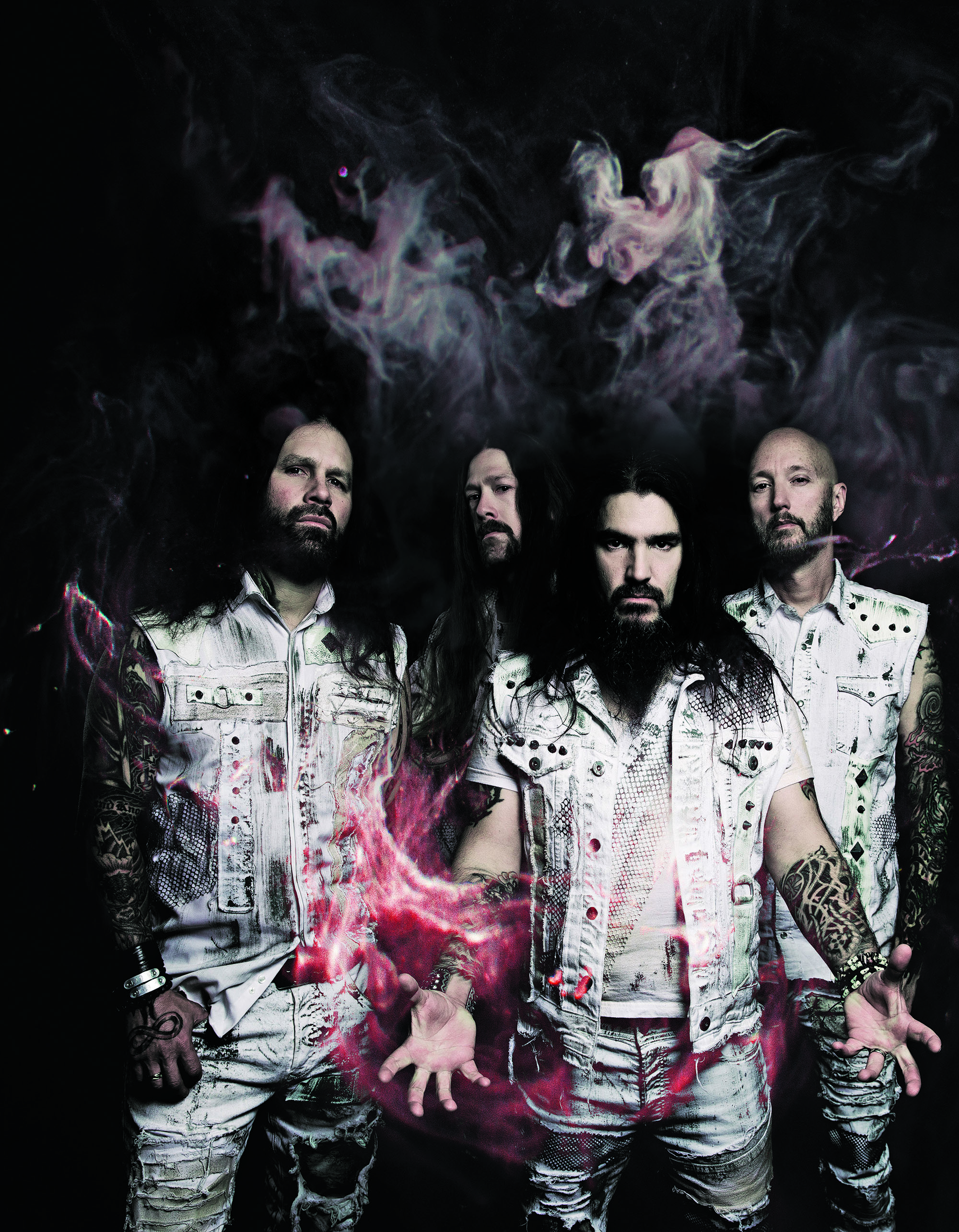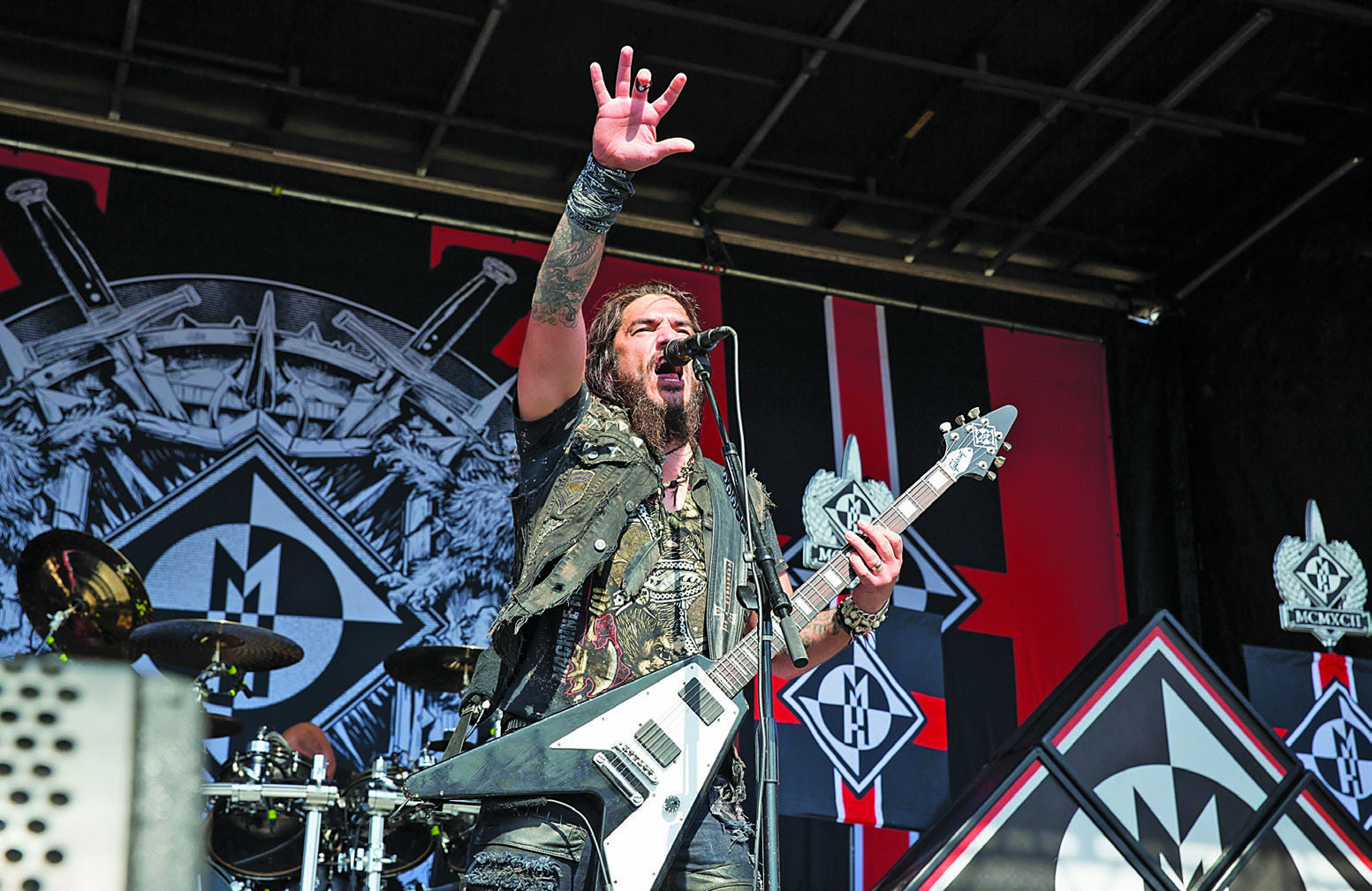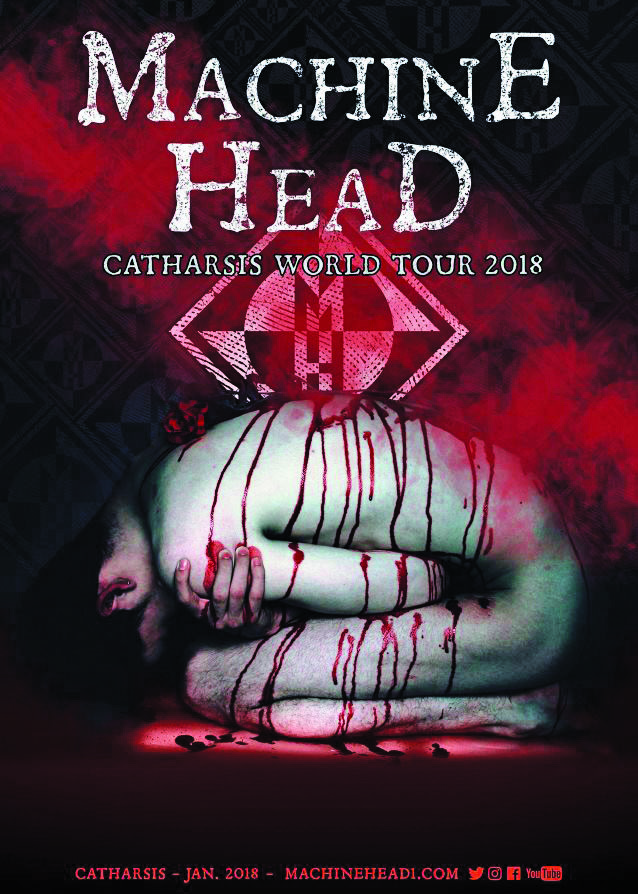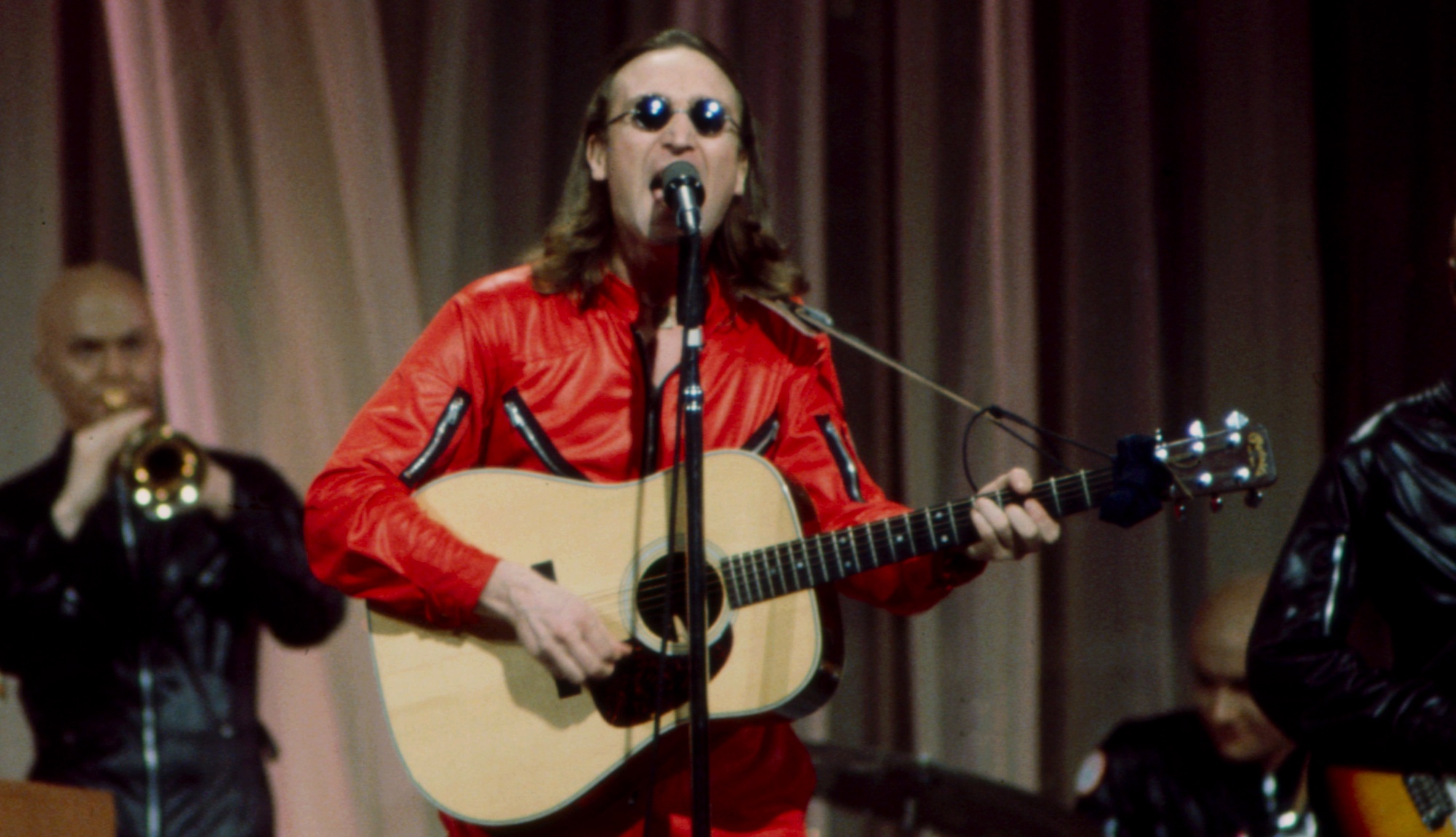Robb Flynn Opens Up About Machine Head's Politically Charged New Album, 'Catharsis'
All the latest guitar news, interviews, lessons, reviews, deals and more, direct to your inbox!
You are now subscribed
Your newsletter sign-up was successful

"You ever go dancing?"
Robb Flynn is asking Guitar World a question and, to be sure, it’s hardly the sort of question one would expect from the singer, guitarist and main songwriter of Bay Area groove-thrash kings Machine Head. But smart money says that Flynn has a point to make. And so GW offers the frontman a tentative answer:
“Not often.”
“Me neither!” Flynn quickly responds. “But my wife loves to dance, and so sometimes she’ll drag me to the club. But a friend once told me: ‘You can pull off any dance move as long as you keep a straight face. Because you’ll fucking own it.’ ” And here, Flynn makes his point, using this story to draw a parallel to Machine Head’s new and ninth studio album, a massive 15-song, hour-plus offering titled Catharsis. “To me, there were a handful of songs on this record where I was like, ‘Can we own this?’ ” he says. “Because some of these songs are definitely out of our wheelhouse.”
True to Flynn’s word, the new Catharsis is unlike any album Machine Head—which also currently includes guitarist Phil Demmel, drummer Dave McClain and bassist and backing vocalist Jared MacEachern—have released over the course of their career. To be sure, there are plenty of tracks—the throttling opener “Volatile”; the nihilistic thrash-’n’-roll workout “Razorblade Smile”; the grinding, downtuned groover “Triple Beam”—that make it clear that, almost a quarter-century after their landmark 1994 debut, Burn My Eyes, Machine Head are still one of the most ferocious and explosive units in modern metal.
But Flynn also uses the album’s ample run time to showcase songs that explore other sides of the band’s musical makeup. Chief among these tunes is “Bastards,” which finds the singer ranting against politicians, Wall Street, racists, rednecks and other perceived enemies of liberty over a musical backdrop that is equal parts punk-metal anthem and folk-rock protest song. And other tracks, from the grungy “Screaming at the Sun,” to the unplugged ballad “Behind a Mask,” which features a full-on acoustic guitar solo, to the atmospheric, almost post-metal closer, “Eulogy,” are similarly outside the standard Machine Head box.

In early interviews about Catharsis, Flynn went so far as to warn fans that they shouldn’t expect the record to rank among the band’s heaviest. But, he says, “You know what, man? We’ve got some great fucking songs here. And it’s still heavy, it’s still Machine Head. But it’s definitely not the traditional Machine Head. It’s really different from what we’ve done in the past. And that’s a good thing.”
All the latest guitar news, interviews, lessons, reviews, deals and more, direct to your inbox!
And lest any fans be concerned that Flynn and Co. bit off more than they could chew with Catharsis, the frontman returns to his earlier analogy about dancing. “We just decided, ‘Let’s put on that straight face and fucking own it,’ ” he says. “And we did.”
Since day one you’ve been pretty upfront about the fact that Catharsis is not Machine Head’s heaviest record.
When I first made those comments it was because fans were asking, “What does the record sound like?” And it’s such a cliché that every metal band says, “It’s the heaviest shit ever!” So I started thinking about it in real time, and I was thinking about songs like “Behind a Mask” and “Bastards” and “Eulogy,” and I was like, “It’s not the heaviest. And it’s really melodic. And it’s really grooving. It’s probably the least thrashy we’ve been in a long time.” And when I started saying that it freaked some fans out. But I think you’ve got to be honest with your fans. I could make someone think this album is fucking Reign in Blood right now if I wanted to. But that wouldn’t be very sincere of me. So I just told it how I thought it was.
Those songs you mentioned, in particular “Behind a Mask” and “Bastards,” are pretty far from the normal Machine Head fare.
Yeah. “Behind a Mask” is a first for Machine Head. There’s no heavy guitar riff and no heavy vocals throughout the whole song. And “Bastards,” it’s a folk song. Lyrically, that song was written the day after the [2016 presidential] election. It was based on a conversation that I had with my two boys. And it was a complicated conversation. So the next day I just started writing lyrics, and those words just vomited out of me in, like, 60 minutes. In order. And that doesn’t happen too often. And when I was done I had that melody for the chorus in my head and I picked up my acoustic guitar and I started strumming four chords that I’ve heard a million times over the years. It’s four chords that have been around forever. And I knew that and I didn’t care. And I worked out the song right there. And then the intro is like a six-fingered tapping thing. It’s fucking insane.

At the same time, there’s also things like the opening track, “Volatile,” which is just a straight-up classic Machine Head rager.
I wrote that the day of the Charlottesville [far-right] rally. We were in the studio and I’d been watching that shit unfold on TV for two days. I literally watched Heather [Heyer] get murdered. And I was like, “What the fuck?” I went into the lounge of the studio and just starting writing lyrics, and 20 minutes later I was singing them and we were recording the song. And that’s what you hear. If music is a snapshot of somebody’s headspace in a moment, you got a pissed-off, angry, frustrated, confused moment right there.
Can you talk about your gear setup on Catharsis?
My main guitar is this custom baritone that I have had for about a decade now. I want a tight downtuned tone, not something sludgy, so getting the baritone with the longer scale neck was amazing. Because those three extra inches just makes the strings so much tighter. Not to mention I’ve got fat fingers! [laughs] The guitar was handmade by this guy Dragan, and it’s just a fucking awesome guitar. I actually have a little arsenal of guitars from him. Then my main amp was my old [Peavey] 5150, which I’ve had for like 23 years now. Its name is Bubba. There’s nothing that’s been done to it—it’s just one of those heads that sounds better than all of the other heads for no reason in particular. I play all the rhythms on the album, and we quad the guitar tracks—two on the left and two on the right. One side is the 5150 through a Boogie cab and the other side is the 5150 through a vintage Marshall cab.
How about effects?
There are tons of effects. I’ve got a Bradshaw unit and also a bunch of old pedals from the Seventies and Eighties. I love the [Electro-Harmonix] Electric Mistress. That’s on pretty much every song on the record. Then there’s a Boss chorus, a Boss delay, a Dunlop Jimi Hendrix Fuzz Face, and those old Line 6 multi-effect units that have delays and filters and phasers and shit like that. For me, I like to have a guitar tone for a minute and then it’s gotta go into some weird psychedelic shit that takes it into another realm. And that kind of thing is all over the record. But you know, as far as tones, there’s no Kemper or anything like that. In a lot of ways it’s a very raw record.
Lyrically, there are several songs on the album, including “Bastards” and “Volatile,” that touch on political and cultural issues. You’re a guy who’s known to be outspoken about your views. Have you experienced any backlash because of this?
For sure. I mean I get “Shut up and play” every day. Every time I post something on social media. But for a long time now we’ve had these pretty political songs, going back to the first album. So if someone says, “I don’t wanna hear it,” it’s like, “What band have you been listening to?” [laughs]
You would think fans would not only expect it from you, but that they would welcome it.
Well, you know, I think musicians have for the longest time walked this line about being apolitical, in order to not upset anybody. But the Beatles were writing about the Civil Rights movement with songs like “Blackbird,” and Black Sabbath were writing anti-Vietnam War songs like “War Pigs.” Those are pretty powerful statements, and they’re statements that inspired me. So I just think it’s weird that metal bands have written so many songs about wars from 150 years ago, but they won’t write about the wars that are going on now. I mean, there are some bands that have entire albums and careers based on wars that happened hundreds of years ago! But we’re all afraid to comment on what’s going on today. That’s just strange to me.
There also have been times when you’ve challenged your fan base from a musical perspective. For instance, some people tend to slag on the Burning Red era of the band, when you brought in some nu-metal influences. But for a lot of your longtime fans, that period was probably their introduction
Yeah. I would say the majority of fans that we still have with us are from the Burning Red era. And you know, in a lot of ways, to me, Catharsis could have been the record that came after The Burning Red. And night after night we play “From This Day” and “The Blood, the Sweat, the Tears,” and people lose their fucking minds. And The Burning Red was really when the more gothy influences came to the fore. Because we were always big Cure fans, and we were also adding in the almost poppy elements they had in songs like “Pictures of You.” And I think with Catharsis, more so than with any of our other records, there’s a lot of pop elements in there, too.
Does it feel like you really pushed the envelope as far as your sound on this one?
I think so. And that’s exciting to us. We’re nine albums deep, and I’m constantly asking myself, “How do we make people go, ‘Oh shit! That’s Machine Head?’ ” It’s hard. Especially as you get older. But you have to look at your legacy, you have to look at good decisions and bad decisions you’ve made, and you’ve gotta just throw all that away. You have to live in the moment and go, “This is what we’re doing now.” I mean, lots of people say, “We want you to do The Blackening again.” Or “We want you to do Burn My Eyes again.” And I’m like, “I’m 50 years old! I’m never gonna be that fucking insane, pissed-off 23-year-old kid running around the streets of Oakland like I was back then.”
With all due respect, you still sound pretty pissed off. The first words we hear on Catharsis are you screaming “Fuck the world!”
[laughs] Thank you. I appreciate that! But you know, Keith Richards once said, “We’re all just a vessel, and your job is to let the music go through you.” And I truly believe that. You’re just trying to channel whatever’s coming. I think that’s the way the best music is made. And I feel like we’ve got something really special with this record.
Rich is the co-author of the best-selling Nöthin' But a Good Time: The Uncensored History of the '80s Hard Rock Explosion. He is also a recording and performing musician, and a former editor of Guitar World magazine and executive editor of Guitar Aficionado magazine. He has authored several additional books, among them Kurt Cobain: Montage of Heck, the companion to the documentary of the same name.

